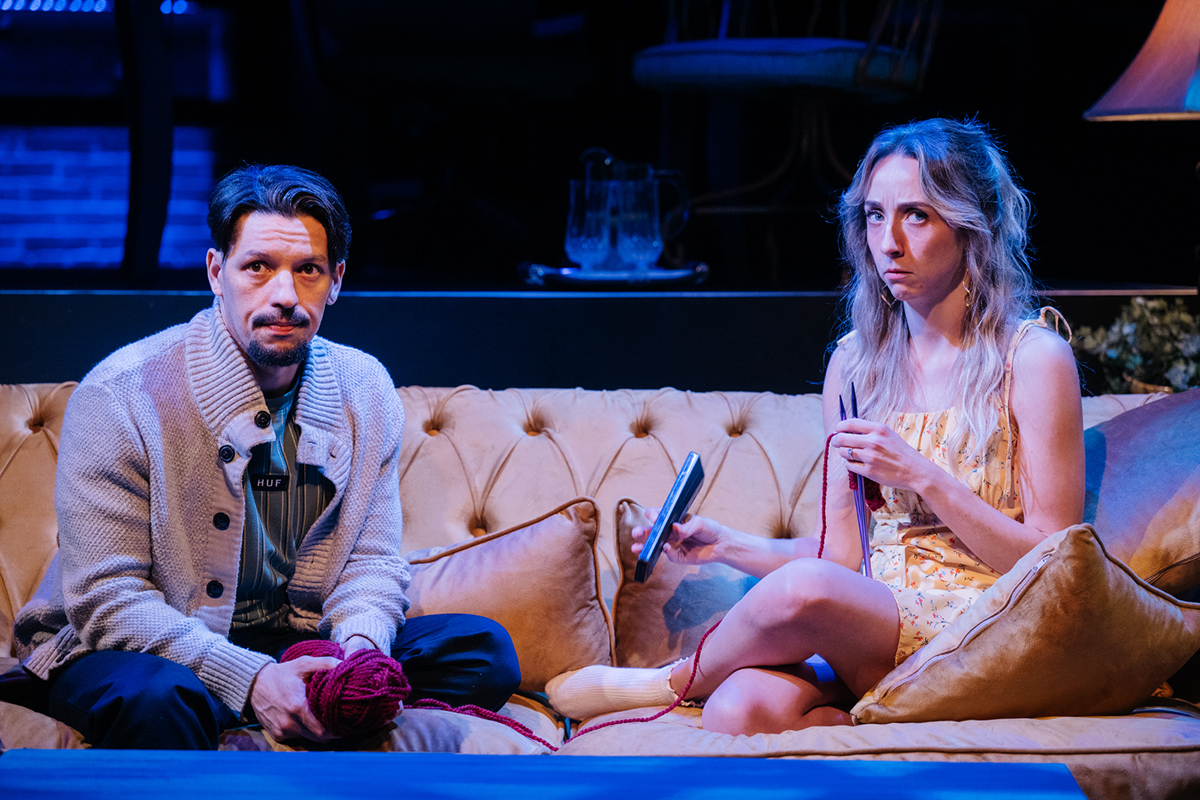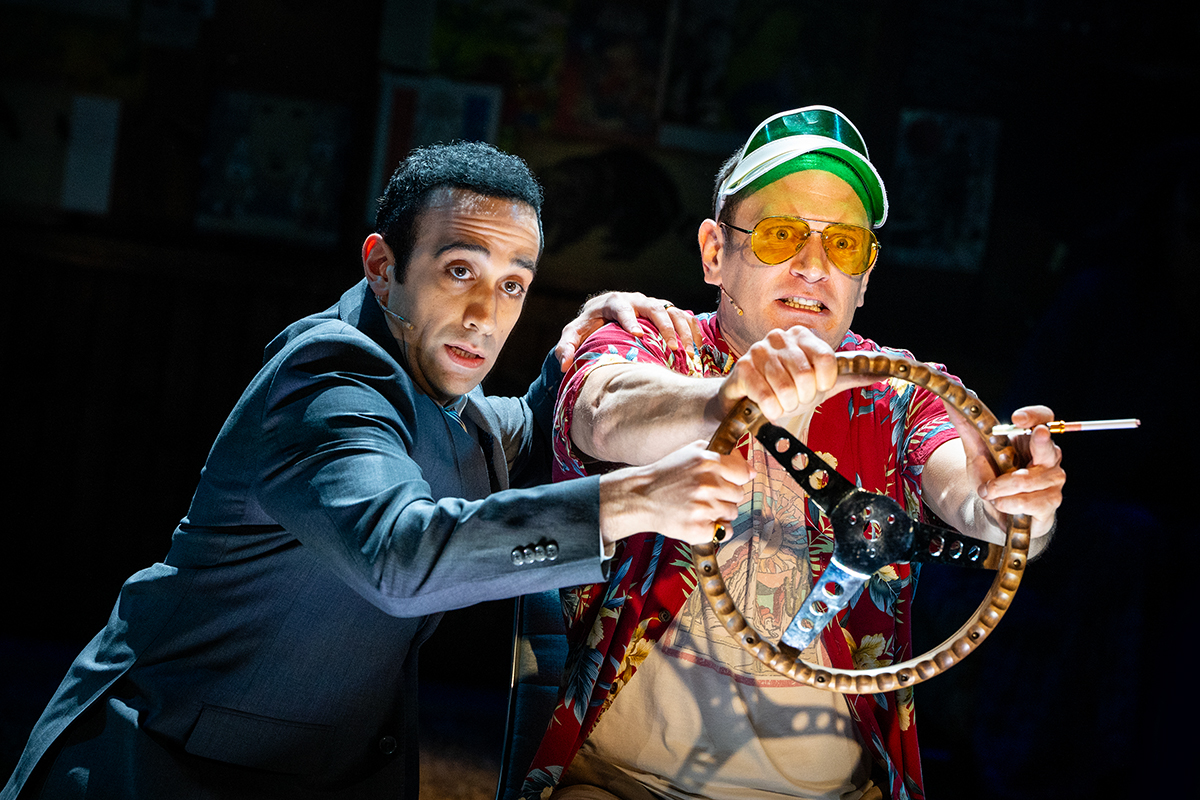‘Frankenstein’ Reimagined as a Marital Drama
Emily Burns’ modern remix of Shelley’s tale at the Shakespeare Theatre lacks chemistry and emotional payoff.

Much like the recent Akira Kurosawa Explains His Movies and Yogurt (with Live & Active Cultures!) at Woolly Mammoth, Emily Burns’ Frankenstein, now at The Shakespeare Theatre, clings to the bumper of a more established artist’s life and work.
Whereas Akira wrapped itself around one of film’s finest auteurs, Burns uses Mary Shelley’s gothic classic along with context from Shelley’s life to make points, various and sundry. Although there is more substance here than in Akira, hitching a ride with Frankenstein feels equally unnecessary. Because, shed the gothic set and references to a monster, and this play is basically a portrait of a modern marriage.
Indeed, Burns gives Elizabeth and Victor Frankenstein such a contemporary vibe in dialogue and demeanor that they could be transported to a suburban house or urban apartment and little would need to change. And although not fully explored, their bones of contention are relevant and relatable. Blow away the cobwebs and it all ends up begging the question of why she ever needed to involve Frankenstein in the first place.
Sure, it may be mildly novel and showcase Burns’ ability to leap through literary and theatrical hoops, but other than a bit of atmosphere and a tribute to a female author, it adds little. In fact, there are times when the overlay of what Victor has been up to during his long absences and the suggestion of some kind of lurking monster are so beside the point, they are a distraction.
And in justifying the exercise, Burns draws way too much in from both the book and the context of Shelley’s life. Beyond marital roles and sexism, she surfaces issues around adoption and belonging, mothering, family rivalries, gaslighting, paranoia and coercive control. Pulling it all together is a challenge she never quite meets.
For example, her device of offering occasional voice-over excerpts from the book to remind us of some of her many themes feels wholly grafted onto the proceedings. It doesn’t help that they are delivered with about as much inflection as an automated parking kiosk. The play’s engine is the push and pull of this couple’s relationship and that was more than enough for Burns to be getting on with.
Set aside all the hard work of unpacking Burns’ messaging and it’s also just frustrating: why the need to take something so beautifully scary and turn it into an onion’s worth of metaphor?
The other problem here is in the production’s uneven performances, which must also land at Burns’ feet since she serves as director. Almost nobody is especially convincing and there is a serious dearth of chemistry. Rebecca S’manga Frank may be a riveting presence as Elizabeth but much of her approach and too many of her mannerisms are your typical Netflix-drama fare and lack authenticity.
As for Victor, Nick Westrate occasionally offers an appealing naturalism, but all too often he is looking hungrily at the scenery. When he actually throws himself onto the floor in a fit of emotion, it is an unfortunate reminder of a far more memorable Dr. Frankenstein delivered by the inimitable Gene Wilder.
There is so little rapport between this couple that the expository that they were raised together becomes the only thing that explains why we are even here watching them grapple. Without any true emotional frisson, we are left with a kind of cat-and-mouse of marital wills. While this can, at times, intrigue, the routine interruptions for “more Frankenstein stuff” means the play never reaches a satisfying catharsis.
For other uncertain reasons, Burns writes the family maid Justine, Younger Victor, Caroline, and the Creature more in the novel’s 19th-century style, making them stilted by comparison. As Justine, this leaves Anna Takayo with the rather thankless task of being the cliched voice of selfless working-class values and purveyor of the kind of pointless female martyrdom that is supposed to have a point.
Her voice work as young Victor, whether by design or accident, is wholly unconvincing and does little to enhance Burns’ rather thin depiction of his mother’s preference for the adopted Elizabeth. For his part, Lucas Iverson as the Creature does much with little, despite being basically a metaphor in a fur coat.
And when it comes to the Creature, you might argue that this play was always meant to be seen as some kind of multi-layered this or that, a thing more construct than narrative, and so on. But the complexity of this Frankenstein feels too much the focus. It’s more a gothic miasma of themes than a story well told.
Frankenstein (★★☆☆☆) has been extended through June 29 at The Shakespeare’s Michael R. Klein Theatre, 450 7th St. NW. Tickets prices vary. Call 202-547-1122 or visit www.shakespearetheatre.org.
Support Metro Weekly’s Journalism
These are challenging times for news organizations. And yet it’s crucial we stay active and provide vital resources and information to both our local readers and the world. So won’t you please take a moment and consider supporting Metro Weekly with a membership? For as little as $5 a month, you can help ensure Metro Weekly magazine and MetroWeekly.com remain free, viable resources as we provide the best, most diverse, culturally-resonant LGBTQ coverage in both the D.C. region and around the world. Memberships come with exclusive perks and discounts, your own personal digital delivery of each week’s magazine (and an archive), access to our Member's Lounge when it launches this fall, and exclusive members-only items like Metro Weekly Membership Mugs and Tote Bags! Check out all our membership levels here and please join us today!



























You must be logged in to post a comment.